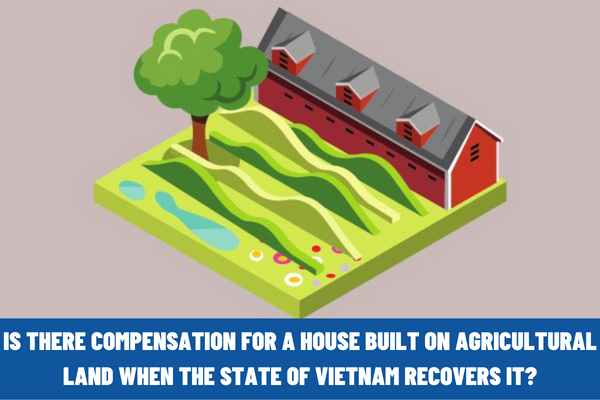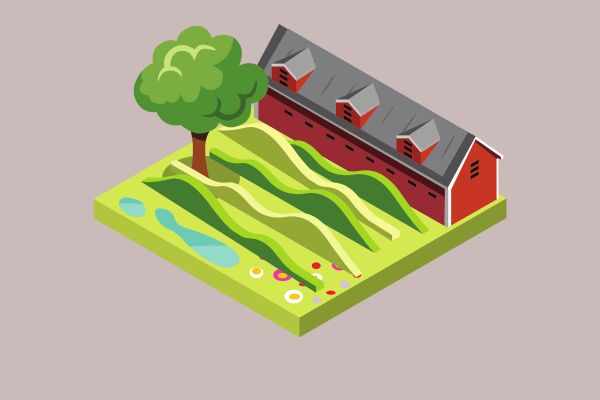Is there compensation for a house built on agricultural land when the State of Vietnam recovers it? What acts are prohibited in relation to land?
Is there compensation for a house built on agricultural land when the State of Vietnam recovers it?
Pursuant to Clause 1, Article 10 of the 2013 Land Law of Vietnam:
Land classification
Depending on land use purpose, land is classified into the following types:
1. Agricultural land, including:
a/ Land for cultivation of annual crops, including paddy land and land for cultivation of other annual crops;
b/ Land for cultivation of perennial trees;
c/ Land for production forests;
d/ Land for protection forests;
e/ Land for special-use forests;
f/ Land for aquaculture;
g/ Land for salt production;
h/ Other agricultural land, including land used to build greenhouses and other building types for cultivation purpose, including fanning not directly on the land, or to build breeding facilities for cattle, poultry and other animals as permitted by law; land for cultivation, breeding and aquaculture for the purpose of learning, research or experimentation; land for planting and nursing seedlings and breeders, and land for growing flowers and ornamental plants.
...
Thus, according to the above regulations, agricultural land is the type of land used for agricultural purposes such as cultivation, animal husbandry, production activities related to agriculture.
Pursuant to Clause 1, Article 6 of the 2013 Land Law of Vietnam as follows:
Land use principles
1. Compliance with land use master plans and plans, and use for proper purposes.
2. Economy, effectiveness, environmental protection, and causing no harm to the legitimate interests of adjacent land users.
3. Land users may exercise their rights and perform their obligations within the land use term in accordance with this Law and other relevant laws.
Thus, according to the above provisions, the land use principles include the use of land for proper purposes. Therefore, it is illegal to build houses on agricultural land.
Pursuant to Clause 2, Article 92 of the 2013 Land Law of Vietnam stipulating as follows:
Cases ineligible for compensation for land-attached assets upon land expropriation by the State
1. Land-attached assets falling into any of the cases of land expropriation specified at Points a, b, d, e, f and i, Clause 1, Article 64, and at Points b and d, Clause 1, Article 65 of this Law.
2. Land-attached assets which are illegally created or created after the notice of land expropriation by a competent state agency takes effect.
3. Technical infrastructure, social infrastructure and other construction facilities which are no longer in use.
Thus, according to the above provisions, the act of building a house on agricultural land is an act of building a house against the law. Therefore, when the land is recovered by the State, the owner will not be compensated for the house built on that land.
Is there compensation for a house built on agricultural land when the State of Vietnam recovers it? What acts are prohibited in relation to land?
How to define non-agricultural land?
Pursuant to Clause 2, Article 10 of the 2013 Land Law of Vietnam, non-agricultural land groups include the following types of land:
- Residential land, including rural residential land and urban residential land;
- Land for construction of offices;
- Land for national defense or security purpose;
- Land for construction of non-business facilities, including land for construction of offices of non-business organizations; land for construction of cultural, social, health, education and training, physical training and sports, science and technology, and diplomatic facilities and other non-business facilities;
- Land for non-agricultural production and business, including land for industrial parks, industrial clusters, export processing zones; land for trading and service; land of non-agricultural production establishments; land used for mining activities; and land for production of building materials, and pottery;
- Land used for public purposes, including:
+ Land used for transport (including airports, airfields, inland waterway ports, maritime ports, rail system, road system and other transport facilities);
+ Land used for irrigation;
+ Land with historical-cultural relics or scenic spots;
+ Land for community activities or public entertainment and recreation;
+ Land for energy facilities;
+ Land for post and telecommunications facilities;
+ Land for markets;
+ Land for waste dumping and treatment;
+ Land for other public facilities;
- Land used by religious institutions;
- Land used for cemeteries, graveyards, funeral service centers and cremation centers;
- Land with rivers, streams, canals, springs and special-use water surface;
- Other non-agricultural land, including land for motels, tents and camps for workers in production establishments; land for warehouses and houses to store agricultural products, plant protection drugs, fertilizers, machinery and tools for agricultural use, and land for other buildings of land users which are used for non-commercial purposes and not attached to residential land.
What acts are prohibited in relation to land?
Pursuant to Article 12 of the 2013 Land Law of Vietnam stipulating that prohibited acts related to land include:
- Encroaching, occupying or destroying land.
- Violating publicized land use master plans and plans.
- Failing to use land, or using land for improper purposes.
- Failing to comply with law when exercising the rights of land users.
- Acquiring agricultural land use rights exceeding the quota set for households and individuals as prescribed by this Law.
- Failing to register with competent state agencies when using land or making transactions of land use rights.
- Failing to perform or fully perform financial obligations toward the State.
- Abusing positions and powers to act against land management regulations.
- Failing to provide land information or providing incorrect land information as prescribed by law.
- Obstructing, or causing difficulties to, the exercise of the rights of land users as prescribed by law.
LawNet
